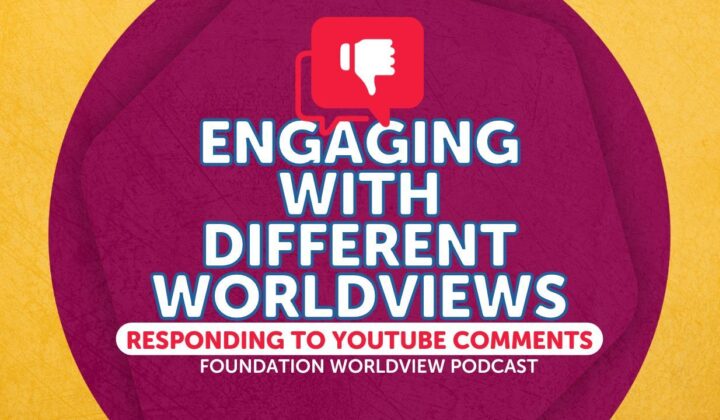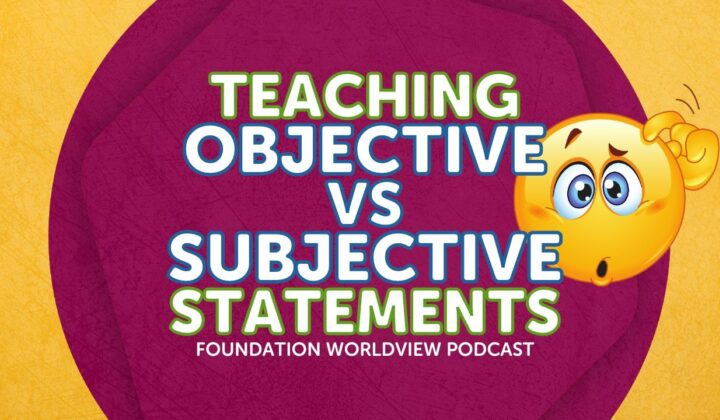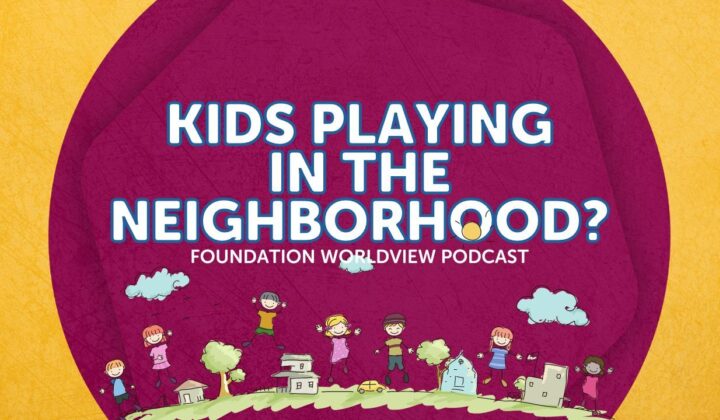Learn more about the journey that led to us equipping kids to carefully evaluate every idea they encounter.
Meet members of our team who have contributed to curriculum development.
Hear from real users of the Foundation Curriculum.
Learn what we believe about God, Jesus, Scripture, and more.
Teaching Kids to Share the Gospel
Today's question says, "My children and I have many friends from different religious backgrounds, Mormon, devoted Christian, lukewarm Christian, and non-Christian. My kids know the differences, but how can I teach them to effectively tell their friends about the good news? Hopefully without offense?"
Transcript
Note: The following is an auto-transcript of the podcast recording.
Hello friends, and welcome to another episode of the Foundation Worldview Podcast where we seek to answer your questions so that you can equip the children that God has placed in your care to carefully evaluate every idea they encounter and understand the truth of the biblical worldview. I'm your host, Elizabeth Urbanowicz, and I'm thrilled that you've joined me for another episode today. Today's question says, "My children and I have many friends from different religious backgrounds, Mormon, devoted Christian, lukewarm Christian, and non-Christian. My kids know the differences, but how can I teach them to effectively tell their friends about the good news? Hopefully without offense?" This is an important question for us to think through. How are we as a family to be a gospel light to those that God has placed in our sphere of influence?
Before we dive down deep into answering this question, just as a reminder, if you have a question that you would like for me to answer on a future Foundation Worldview podcast, you can submit that by going to FoundationWorldview.com/podcast. And we actually couldn't do this podcast without you, without submitting your questions. So thank you to everyone who has taken the time to do that so that we can continue with this podcast. Also, just ask that you would invest the time clicking that five stars on whatever podcast platform you're listening to so that you can rate this content and we can get it into more hands. Of course, if you don't think it's five star, you can give it another star review. But does the ratings really help us expand the influence and the reach of this podcast.
Now, as we think through this question, how can we prepare our kids to effectively share the gospel with their friends? The first thing we have to do is we have to make sure that we are modeling this for our kids, that if we are not sharing the gospel with our non-Christian friends and family and neighbors, we can't expect our kids to do this. And now this is something that I am so grateful that my parents faithfully modeled for me and for my brother and my sister while we were growing up, that my parents would always tell us that we were intentionally in the neighborhood where we lived so that we could be a gospel light. I know that for several years during my growing up time, there was a widow that lived down the road from us who was Mormon, and my mom would have her over every Thursday night for dinner. And now I believe, if I'm remembering correctly, I think that this woman was in nursing school at the time, so she didn't have a lot of time to spend at our house for dinner, but our mom faithfully had her over for dinner every Thursday. And I remember just hearing my mom sometimes just asking her questions about her beliefs and sharing the true gospel with her. So this was something that my mom modeled also my dad, when we would have neighbors over who were not Christians, my dad would intentionally ask them questions to get them thinking about their worldview and to get them thinking about the gospel. And this is something that my brother and sister and I just naturally picked up because our parents were modeling this. I remember my brother was probably only maybe in fifth grade, but I remember my parents found out and we're so grateful that my brother had actually written our neighbor a letter that there was an elderly man who lived next to us and he wasn't a widower, but his wife had severe dementia. And just for the last decade or so of their marriage, she was actually in a nursing home just because her dementia was so severe. And my brother would go over and he would rake our neighbor's yard and sometimes mow the grass. And he actually wrote him a letter about the truth of the gospel, sharing the good news of Jesus with him. And why was my brother passionate about this? Because it's what our parents modeled for us.
So that's something we need to ask ourselves. Are we opening up our home to our non-Christian friends and family and neighbors? Now, obviously we want to share the gospel with others, but we need to make sure that we are not solely opening up our home to our non-Christian friends and family and neighbors for the purpose of sharing the gospel. That yes, we want to share the gospel with them, but these people are people. They're not projects. Because I remember one time I was visiting some family members of mine in another state who are not believers, and it was my whole goal at the time there that I would have a gospel conversation with them. And I did get to ask them some good questions, but I didn't actually get the opportunity to share the full gospel with them. And I remember sharing with my mom when I got back from that trip about how disappointed I was and how I felt like I failed. And my mom was like, Elizabeth, these are our family. We love them because they're our family. And the goal wasn't that you would get to share the whole gospel with them, but that you would love them. And who knows what other opportunities God will give you.
So we need to make sure that we're modeling this for our children, that we are opening up our home to our friends and family and neighbors, and that we are loving them because we love Jesus and out of our love for Jesus, we therefore love them and that we then do intentionally share the gospel with them as we have the opportunity.
And I think a really easy way to do this is by including our non-Christian friends and family and neighbors in family devotions that we should be having family devotions every night at dinner. And then when we have our friends and family and neighbors over that, we just say, oh, it's our family devotions time. And so this is how we do it. And you're invited to be part of this. This is something that I love every time I am over the Butterfield home - Kent and Rosaria Butterfield. Rosaria has the book, "the Gospel Comes with a House Key", and I just love that she and her husband, Kent, really live out everything she has written about in that book that their home is just open on a nightly basis and they have family worship time together at the end of every meal that at the end of every meal that Rosaria goes and she gets the salters and the salters are passed out, and then she leads everyone in singing a psalm. And then Kent will open up Scripture and open up a devotional book and he will lead the family and family devotions, whether it's just the family, whether it's those of us who are Christians who are visiting or whether there are non-Christians, and because that's a part of their daily life that everyone who comes to their home just knows this is what's done at the Butterfield home. There's a great meal. There's times of getting to know one another and laughing around the table, and then there's a time of family worship. And so we need to make sure that this is a part of our daily life in our families. And so when we have non-Christian friends and family and neighbors over that, they're just invited into that time.
Now, another thing that we need to make sure that we're doing is we're equipping our kids to actually articulate the gospel that we should ask them what is the gospel? How would we explain that to others? Several years ago, I led a bible study for teenage girls in the church where I attend. And I was actually, when I started off this Bible study, I just gave them a little five question survey. I didn't know many of them very well, and I wanted to know just certain things about them in their faith journey. And I asked them, if someone asked you to explain what the gospel is, how would you explain it? And when I gave out that survey, there were 12 different girls who completed that survey and only one of them correctly explained what the gospel is, that it is the bad news. I mean, she didn't say it this way, but it's the bad news of our sin that we are fallen and we're separated from God. But God because of his great love for us sent us Jesus, his son, to die in our place, to bear the full weight of his wrath toward our sin, so that when we turn from our sin and trust in him, we can be brought into God's family and given new life. There was only one girl who could articulate that most of the girls, they came from great gospel centered homes, and they had heard the word gospel over and over and over and over again, but they couldn't actually articulate what it was. Most of them said, the gospel is the word of God, or the gospel is God's truth, or the gospel is the Bible. And so we want to make sure that our children actually understand what is this gospel? This gospel is the good news, and part of the good news is the bad news.
And so really helpful. I think just three step paradigm that we can give our kids is creation, fall redemption. How were we created? We were created in the image of God and we have inherent value and worth. But then there was the fall. This is what's wrong with the world that we chose to rebel against God. We sinned against him, and now our relationship with God is broken and that relationship is redeemed. It is restored through the life, death and resurrection of Jesus. So if we could just teach them this creation, fall redemption paradigm, that's an easy way for them to share the gospel.
It's also an easy way for them to find out about different people's worldviews because we can then train them to ask good questions. !Questions such as "What do you think is wrong with the world?" That's the fall part of it. According to Christianity, what's wrong with the world is that we have rebelled against our creator and we are inherently sinful and we choose to sin every day. That's what's wrong with the world. But we want to find out what do our friends and neighbors think is wrong with the world? And we can ask them a follow-up question, what makes you think that? What makes you think that selfishness or that independence or that whatever it is, is what's mainly wrong with the world? And then we can ask them about the redemption part. What do you think is the solution to this problem? And then follow up with how did you come to believe that? And then we can ask, can I share with you what I believe is true? So I think this creation-fall-redemption paradigm can be really helpful for getting our kids to explain clearly what the gospel is, but also to train them to ask good questions. What do you think is ultimately wrong with the world? What makes you think that? What do you think is the solution to this problem in our world? How did you come to believe that? And then can I share with you what I believe? Now, sometimes faithfully living out the gospel with others isn't going to look like sharing the gospel with them every single time we're with them, but actually just living it out. And I think something that we can do and we can model for our children and then train them to do is in different situations, to ask, can I pray for you? That when I first moved to the neighborhood where I live now, my neighbors, several houses down were Muslim and they're from Pakistan, and we became really good friends, and I would frequently be at their house one or two times a week, and I would ask them questions about their beliefs in Islam, and I would share here and there with what I believed with Christianity. But then they went through a personal tragedy in their life. It was a really deep tragedy. And when I was over there and talking with the wife, I just said, can I pray for you now? And so I prayed for her. We just stopped right then and there, and I prayed for her. And so this is something that we can do to help open up our neighbor's eyes to the fact that God is real, that he exists, that he loves them, that he cares about what's going on in their lives.
Now, the final part of this question asks, how can we train our kids to tell their friends about the gospel without offense? And obviously we want to strive to be winsome. We want to strive to communicate the truth in a way that is loving and is full of grace. That's what Jesus has modeled for us.
However, I would say in today's culture, it is very, very difficult to not offend others because we live in a culture where just everybody is offended about anything, about everything. Anytime somebody feels the slight bit uncomfortable about something, they're like, oh, that's offensive. Don't say that. And so we have to understand that yes, we want to be winsome. We want to be loving. We want to be good listeners. We want to actually care about our non-Christian and Christian friends and family and neighbors because they bear the image of God and because we love God. So we should love them. But as we share the truth of the gospel with them, the gospel is offensive. Paul talks about this that he says, for those who have inherited the kingdom, that the gospel is a fragrance of life. But to those who are perishing, the gospel is the fragrance of death. And it's because there is that bad news that we are sinful and we need to turn from that sin.
So yes, we want to help our kids be winsome. We want to be winsome, but we have to understand and help our kids understand that the gospel by nature is offensive to our culture because it's telling us the truth about who we are. And that truth is not a pleasant truth. The fact that we have rebelled against our creator, and there's nothing that we can do in and of ourselves to restore that relationship with our creator. It's only by God's grace through Jesus bearing God's wrath on our behalf, dying in our place and rising again to new life that we can be reconciled to our creator. And so I think it's really important for us and our kids to just understand that the gospel is by its very nature offensive. But we are not to shrink back. As Paul says in Romans one, we are not to be ashamed of the gospel because it is the power of God for salvation.
Well, that's a wrap for this episode. But as always, my prayer for you as we leave this time together is that no matter the situation in which you and the children God has placed in your care, find yourselves that you would trust that God is working all things together for your good by using all things to conform you more into the image of His Son. I'll see you next time.
Related Posts and insights

Engaging with Different Worldviews
In this episode, Elizabeth Urbanowicz responds to comments from a previous episode on talking to children about dinosaurs. She addresses the pushback received from those with different worldviews. Elizabeth then models how to ask good questions when encountering false claims that go against Christianity.

Teching Objective vs. Subjective Statements to Kids
In this episode, we tackle the question: How do we tell the difference between objective and subjective statements? Join us as we dive deep into this topic and discover practical ways to teach kids this important skill.

Kids Playing in the Neighborhood?
In this episode, we tackle the question of how to navigate relationships with neighborhood children while maintaining a biblical worldview. We discuss the importance of discipleship, setting boundaries, and preparing our children to be a faithful gospel witness in their community. Tune in for practical insights and overarching principles to guide you in this important aspect of parenting.





